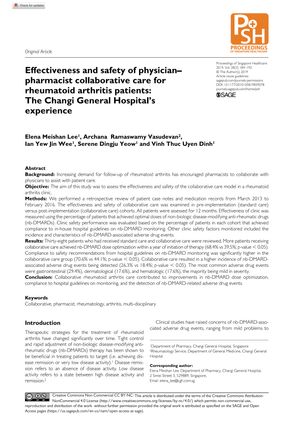Effectiveness and Safety of Physician–Pharmacist Collaborative Care for Rheumatoid Arthritis Patients: The Changi General Hospital’s Experience
April 2019
in “
Proceedings of Singapore Healthcare
”

TLDR Collaborative care between physicians and pharmacists improved medication management for rheumatoid arthritis without raising costs.
The study conducted at Changi General Hospital with 76 rheumatoid arthritis patients compared the effectiveness and safety of a collaborative care model involving physicians and pharmacists to standard care. The collaborative care group, consisting of 38 patients, showed significantly better outcomes in achieving optimal doses of non-biologic disease-modifying anti-rheumatic drugs (nb-DMARDs) within a year (68.4% vs 39.5%), adhering to monitoring guidelines (70.6% vs 44.1%), and detecting adverse drug events (26.3% vs 18.4%). Despite more adverse events being detected in the collaborative care group, likely due to more frequent monitoring, healthcare costs did not significantly differ between the two groups, and patient satisfaction was high. The study concluded that collaborative care improved medication management and safety without increasing costs, although it noted limitations such as a small sample size and the retrospective design.